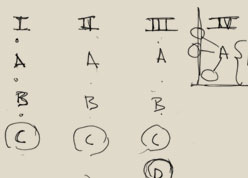Robert Wilson’s Vision of Theater as Spectacle
It is partly because of “The Civil Wars” that Mr. Wilson has accepted so many freelance directing assignments. The nine-hour, $7 million “planetary opera,” which had been scheduled for the 1984 Olympic Arts Festival in Los Angeles, was canceled for lack of funds, and left his nonprofit Byrd Hoffman Foundation some $200,000 in debt. (The Brooklyn Academy of Music will conclude its 1986 Next Wave Festival in December with 10 performances of the Rome section of “The Civil Wars.” And a production of “The Knee Plays,” the work's connecting sequences, with music by David Byrne and choreography by Suzushi Hanayagi, will open next month at the American Repertory Theater in Cambridge and then tour the country; it will be at Alice Tully Hall on Dec. 2 and 3.) Except for the Brooklyn Academy of Music, Robert Brustein's American Repertory Theater has become the most important American champion of Mr. Wilson's work. His next two projects for the company are a staging of Mr. Muller's play “Quartet,” for two actors, and a full-scale staging of T. S. Eliot's “Waste Land,” another Glass collaboration.
Another major forthcoming project is “The Forest,” a film and stage collaboration with David Byrne about the Industrial Revolution, tentatively scheduled to open in Berlin in the summer of 1988. Then, Mr. Wilson plans to work with Philip Glass on a five-hour, nine-act opera, “The Palace of Arabian Nights,” which traces the history of Islamic culture.
Because of its scale and its blending of stage design, music and movement into a total theatrical concept, Mr. Wilson's work has often been described as “Wagnerian.” Inevitably perhaps, Mr. Wilson has been attracted to the operas of Wagner. In the fall of 1990, these two Olympian sensibilities may collide for the first time in a production of “Parsifal,” to be mounted in Hamburg with Jessye Norman in the role of Kundry.
In discussing his esthetic connections with Richard Wagner, Mr. Wilson hastened to point out the vast gulf between their sensibilities.
“Everything in Wagner's work -the music, the acting, the staging -stemmed from the text,” Mr. Wilson emphasized. “Everything served to interpret the text. What I do is not the same. I try to reinforce the text, but with another event that may not have anything to do with it. I think of text as something I hear and the stage action - the gestures, decor and lights - as something I see. My responsibility in creating for the theater is not to say what something is, but to ask, ‘What is it?’ ”
